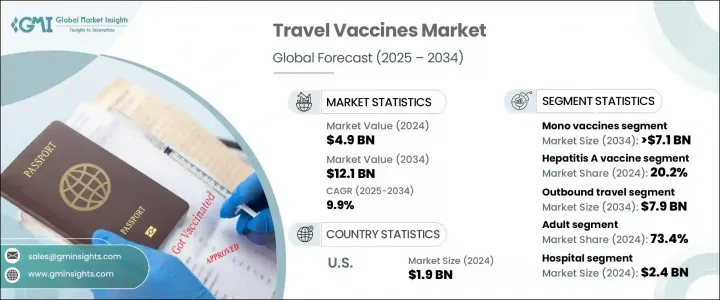
세계 여행용 백신 시장은 2024년 49억 달러로 평가되었으며 CAGR 9.9%로 성장해 2034년까지 121억 달러에 이를 것으로 추정됩니다.
이 시장은 세계의 건강 의식, 백신 시장 개척의 급속한 진전, 해외 여행 패턴의 진화 등이 더해져 기세를 늘리고 있습니다. 지역 질병 위험에 대한 인식 증가와 해외 여행 중 질병 예방에서 예방 접종의 역할은 광범위한 수요에 박차를 가하고 있습니다. 정부의 보건정책, 교육활동, 디지털 헬스 플랫폼은 여행 전 계획에서 백신이 수행하는 중요한 역할을 강화하고 있습니다.

세계 여행의 회복과 다양화에 따라 예방 접종은 특히 건강 관리 인프라가 제한된 지역에서 공중 보건을 유지하는 데 매우 중요한 요소가 되었습니다. 물류를 간소화하고 비용을 절감하고 보존성을 향상시키는 기술 혁신으로 백신 제조 및 공급이 강화되고 있습니다. 이러한 변화로 인해, 여행용 백신은 특히 의료가 잘 되지 않는 지역이나 위험이 높은 지역에서 세계적으로 널리 채택되고 있습니다. 여행용 백신은 광견병, 장티푸스, 황열병, 간염과 같은 감염으로부터 여행자를 보호하기 위해 투여됩니다. 시장은 단일 백신과 혼합 백신으로 구분되며 공공 및 민간 건강 관리 채널을 통해 유통됩니다.
| 시장 범위 | |
|---|---|
| 시작 연도 | 2024년 |
| 예측 연도 | 2025-2034년 |
| 시작 금액 | 49억 달러 |
| 예측 금액 | 121억 달러 |
| CAGR | 9.9% |
모노백신 분야는 2024년에 29억 달러를 판매했고 2034년까지 CAGR 9.7%로 71억 달러에 이를 것으로 예측됩니다. 모노백신의 우위성이 계속되고 있는 것은 표적을 좁힌 예방과 낮은 부작용 리스크에 기인하고 있어 위생 상태가 나쁘고, 질병의 유행이 높은 지역으로 향하는 여행자에게 선호되는 선택지가 되고 있습니다. 장티푸스나 광견병 등의 예방접종은 여행지나 여행 기간, 현지의 헬스케어 상황에 따라 추천되는 경우가 많습니다.
백신 유형별로 A형 간염의 2024년 점유율은 20.2%였습니다. A형 간염의 강한 지위는 식품과 물을 매개로 하는 질병으로부터 몸을 지키는데 필수적인 역할과 관련되어 있으며, 특히 라틴아메리카, 아시아, 아프리카 등 위생 환경이 여전히 큰 우려사항이 되고 있는 지역에서 두드러집니다. 특히 현지 요리를 먹거나 비상업적인 숙박 시설에 머무르는 경우 단기 체류에서도 위험이 발생할 수 있습니다. 감염 위험이 높기 때문에 세계 보건 당국은 대부분의 해외 여행자에게 표준 대책으로 A형 간염의 예방접종을 강력히 권장하고 있습니다.
미국 여행용 백신 2024년 시장 규모는 19억 달러로 2025년부터 2034년까지 연평균 복합 성장률(CAGR) 9.3%로 성장할 전망입니다. 이 성장은 해외 출국자 증가와 적극적인 공중 보건 활동과 일치합니다. 연방 정부 기관은 가이드라인 업데이트 및 아웃리치 활동을 통해 여행 관련 예방접종을 장려하고 시장 확대를 지원합니다. 아웃바운드 관광객 증가와 질병에 대한 의식의 고조가 함께 나라 전체에서의 백신 섭취가 계속 촉진되고 있습니다.
여행용 백신 부문의 기업은 경쟁 우위를 유지하기 위해 혁신, 확장 및 접근성을 중심으로 한 전략을 시행하고 있습니다. mRNA 및 단일 용량 솔루션과 같은 첨단 기술에 대한 투자는 백신의 효능과 전달을 개선하는 데 도움이 됩니다. 기업은 특히 접근이 제한된 지역의 세계 수요에 대응하기 때문에 제조의 확장성을 높이고 있습니다. 공중 보건 기관 및 여행 의료 제공업체와의 전략적 파트너십은 인지도와 유통 범위를 확대하는 데 활용됩니다.
The Global Travel Vaccines Market was valued at USD 4.9 billion in 2024 and is estimated to grow at a CAGR of 9.9% to reach USD 12.1 billion by 2034. This market is gaining momentum due to a mix of global health awareness, rapid advancements in vaccine development, and evolving international travel patterns. Increasing recognition of regional disease risks and the role of vaccination in preventing illness while abroad is fueling widespread demand. Government health policies, education efforts, and digital health platforms are reinforcing the critical role vaccines play in pre-travel planning.

As global travel recovers and diversifies, preventive immunization becomes a crucial component in maintaining public health, particularly in areas with limited healthcare infrastructure. Technology is enhancing vaccine production and delivery through innovations that streamline logistics, reduce costs, and improve shelf life. These shifts are enabling wider adoption of travel vaccines globally, especially in underserved and high-risk areas. Travel vaccines are administered to protect travelers from infections like rabies, typhoid, yellow fever, and hepatitis. The market is segmented into mono and combination vaccines, distributed through both public and private healthcare channels.
| Market Scope | |
|---|---|
| Start Year | 2024 |
| Forecast Year | 2025-2034 |
| Start Value | $4.9 Billion |
| Forecast Value | $12.1 Billion |
| CAGR | 9.9% |
The mono vaccines segment generated USD 2.9 billion in 2024 and is forecast to reach USD 7.1 billion by 2034 at a CAGR of 9.7%. Their continued dominance stems from targeted protection and lower risk of side effects, making them a preferred choice for travelers heading to areas with poor sanitation and high disease prevalence. Immunizations for diseases like typhoid and rabies are often recommended depending on the destination, duration of travel, and local healthcare conditions.
In terms of vaccine type, the Hepatitis A segment held a 20.2% share in 2024. Its strong position is linked to its essential role in protecting against food and water-borne illness, particularly in regions across Latin America, Asia, and Africa where sanitation remains a major concern. Even short visits can pose a risk, especially for those consuming local cuisine or staying in non-commercial accommodations. Due to the high transmission risk, global health authorities strongly recommend Hepatitis A vaccination as a standard measure for most international travelers.
United States Travel Vaccines Market generated USD 1.9 billion in 2024 and is expected to grow at a CAGR of 9.3% between 2025 and 2034. This growth aligns with increasing international departures and proactive public health initiatives. Federal agencies are supporting market expansion by encouraging travel-related immunization through updated guidelines and outreach efforts. The increase in outbound tourism, combined with rising disease awareness, continues to drive vaccine uptake across the country.
Leading players in the Global Travel Vaccines Market include Meiji Group, Dynavax Technologies, Serum Institute of India, Sanofi, GlaxoSmithKline plc (GSK), Valneva SE, Bharat Biotech, Pfizer, CSL, Emergent BioSolutions, Merck, and Bavarian Nordic. To maintain a competitive advantage, companies in the travel vaccines sector are implementing strategies centered around innovation, expansion, and accessibility. Investments in advanced technologies like mRNA and single-dose solutions are helping improve vaccine efficacy and delivery. Firms are enhancing their manufacturing scalability to meet global demand, particularly in regions with limited access. Strategic partnerships with public health institutions and travel health providers are being leveraged to increase awareness and distribution reach.